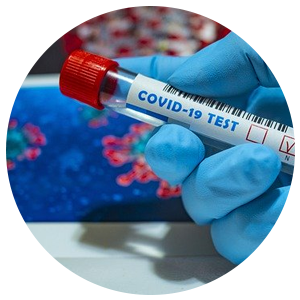Action against COVID-19

The Igarape Institute participated in several efforts to respond and contain the COVID-19 pandemic. For example, the Institute helped launch the União Rio Movement, which collected and donated protective gear and health equipment. As part of the União Amazônia Viva, the Institute also helped organize a major effort to deliver tests and food assistance. The Institute also mapped out the impacts of COVID-19 on issues related to homicide, prisons and violence against women.
Even before the pandemic hit Brazil, the Igarape Institute worked with civil society and business groups to minimize the health and welfare impacts of COVID-19. Together with other institutions, the Institute created the União Rio Movement, a voluntary initiative focused on mitigating the effects of the pandemic in Rio de Janeiro. The initiative raised donations and redistributed them to the most vulnerable social sectors alongside health and social worker professionals in urban peripheries, the spaces most affected by COVID. The movement distributed 8,000 masks to military and civil police and penal authorities. Another 5,000 were distributed to firefighters and others at the military police hospital.
As part of the União Amazônia Viva, the Institute also supported the delivery of humanitarian relief to regions of Alto Rio Negro (AM), Yanomami (AM and RR) and Tapajós-Arapiuns (PA). Specifically, the Institute organized for the delivery of COVID-19 tests, medicines and food aid. In addition, Igarape Institute also supported Cidade Solidária, a joint action by the São Paulo City Hall and civil society organizations to help the vulnerable populations most affected by COVID-19 including the homeless, drug users and lower-income groups.
To alert decision-makers and opinion-makers about the importance of urban and local efforts against the coronavirus, the Igarape Institute also published a vast range of articles. These included reports, interviews and articles with news outlets ranging from France24 to Project Syndicate. The Institute’s research was also featured by Global Parliament of Mayors, USA Today, Época, World Economic Forum, Foreign Policy, Folha de S.Paulo, Associated Press, Estadão, OECD, Fast Company, and CBN among thousands of other outlets.
The pandemic affected public security, including patterns of violence, conditions in the prison system and violence against women. The Institute’s research on these issues was featured by the Financial Times, Wall Street Journal, O Globo, Estadão Cidadania. An opinion article co-authored with Steve Pinker was published in Foreign Policy was shared on Facebook to 1.5 million people and on Twitter to over 700,000 more. The Institute also updated the book Unfulfilled Promises (with Inter-American Dialogue) to account for the COVID-19 crisis. Staff headlined a number of conferences ranging from the Stockholm Forum on Peace and Development and the Singularity Summit to Reage Rio!, Brazil Talk, and Summit Mobility.
A particular concern related to how the COVID19 pandemic might affect conditions in prisons. To this end, the Institute collaborated with the Washington Post and Estadão, articles shared on Facebook with more than 3.5 million followers. The Institute also prepared a strategic report on the issue — Impacts on a population made invisible: the effects of coronavirus on the lives of incarcerated and formerly incarcerated women — that generated an opinion article on Nexo, shared with 500,000 people on Facebook and on Twitter, and another 1.5 million by Manuela D’Avila on Facebook. In late 2020, the Institute also launched a video and a new report called Support for Women Released from the Prison System: Diagnostic of Challenges and Analysis of Opportunities.
A focus of the Igarape Institute was on demonstrating how women encountered difficulties reporting on domestic violence and receiving care during the pandemic. In December 2020, the Institute launched another report — Violence Against Women: How Pandemic Silenced an already Silent Phenomenon. — to highlight the evidence on these issues. Findings were presented at the 14th Annual Meeting of the Brazilian Public Security Forum along with an update of the Institute’s EVA platform – Evidence on Violence and Alternatives for Women and Girls — a data visualization tracking patterns of violence in Brazil, Colombia and Mexico.
The Institute was also invited to join global leaders to in contributing to the World Economic Forum’s Challenges and Opportunities in the Post-COVID-19 World report, Moreover, an interview with The New Humanitarian on how people in slums were most vulnerable was shared with over 100,000 people. The Institute likewise participated in a range of events such as The Future of Cities in the wake of Covid, COVID-19: The State & Future of Pandemics, Phoenix Rising: What does the post-Covid city mean for you?, as well as a seminar with Canning House.


